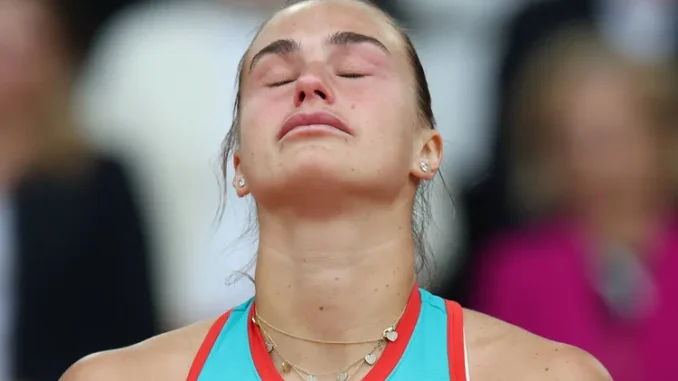
Aryna Sabalenka, the world’s top-ranked tennis player, has publicly expressed deep regret and offered an apology for the controversial comments she made following her defeat to Coco Gauff in the Roland Garros final. Her remarks, which suggested Gauff’s victory was more a result of Sabalenka’s errors than Gauff’s brilliance, drew significant criticism and have since been acknowledged by the Belarusian as “completely unprofessional.”
The French Open final, played just over a week ago, saw Gauff clinch her maiden Roland Garros title with a 6-7(5), 6-2, 6-4 victory over Sabalenka. It was a fiercely contested match where Sabalenka, despite winning the first set, ultimately succumbed to Gauff’s relentless play and her own mounting unforced errors. This marked the second time Sabalenka had lost a Grand Slam final to Gauff from a set up, the first being at the US Open in 2023.
In her post-match press conference at Roland Garros, a visibly emotional Sabalenka was asked to explain the reasons for her loss. Her response quickly ignited a firestorm of debate. “I think she won the match not because she played incredible, but because I made all those mistakes,” Sabalenka asserted, going on to label it “the worst final I had played.” She even speculated that had Iga Swiatek, whom she had defeated in the semi-finals, made it to the final, Swiatek “would come out today and gotten the win. It just hurts.”
These comments were widely interpreted as downplaying Gauff’s well-deserved victory, and even Coco Gauff herself addressed the remarks. While choosing not to dwell on them, the American expressed her viewpoint: “I played her and I won in straight sets. I don’t think that’s a fair thing to say.”
Now, as the grass-court season commences with the Berlin Ladies Open, Sabalenka has taken the opportunity to reflect on her post-final statements and offer a sincere apology. In an interview with TNT Sports, she directly addressed the controversy. “That was just completely unprofessional of me. I let my emotions get the better of me,” Sabalenka admitted. “I absolutely regret what I said back then. You know, we all make mistakes. I’m just a human being who’s still learning in life.”1
Sabalenka acknowledged the heightened scrutiny she faces as a high-profile athlete. “I think we all have those days when we lose control. The difference with me is, the world is watching. I get a lot more hate for what I did than other people,”2 she explained. Her honesty shed light on the immense pressure and emotional toll that Grand Slam finals can take, even on seasoned professionals. “I was super emotional and not very smart at that press conference,” she continued. “It took me a while to revisit it, to approach it with open eyes, and to understand. I realized a lot about myself. Why did I lose so many finals? I kept getting so emotional.”3
The Belarusian emphasized that the experience has served as a valuable lesson. “So I learned a lot. Above all, one thing: I’m the one who always treats my opponents with great respect – whether I win or lose. Without that respect, I wouldn’t be where I am today. So it was a tough but very instructive lesson4 for me.” This statement underscores a shift in perspective, focusing on personal growth and a commitment to upholding the sportsmanship that defines professional tennis.
As Sabalenka now turns her attention to Wimbledon, a tournament she has yet to conquer despite reaching the semi-finals twice, her reflections offer insight into her competitive drive. “We all have the same goal: to win the tournament,” she stated, reiterating her ambition. “I’ve built a lot of self-confidence over the years, but at the same time, I’ve realized it has nothing to do with self-confidence. It’s about how willing you are to go out on the court and compete, even when things aren’t going so well. It’s about how willing you are to go out there and fight for what you want.”5
Her willingness to openly apologize and reflect on her actions demonstrates a commendable level of maturity and self-awareness. It suggests that while the pain of defeat can elicit regrettable responses, the lessons learned from such experiences can ultimately contribute to a stronger, more complete athlete and individual.
Leave a Reply